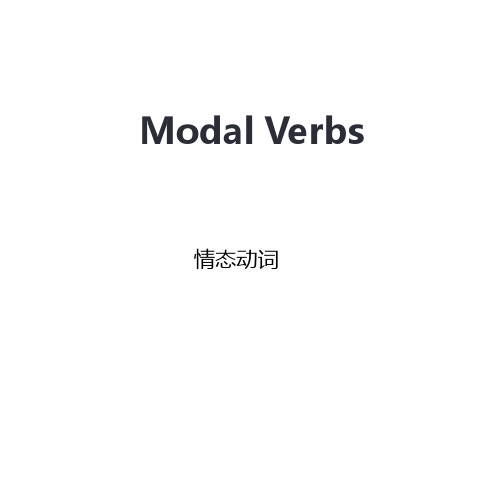初中英语情态动词课件[1]
合集下载
情态动词(20张PPT)初中英语专项复习课件

看法。
(1)只作情态动词:must;can/could;may/might;ought to
(2)既可作情态动词又可作实义动词:need,dare
((34))既 具可 有作 情情 态态 动动词词某又些可特作征稿稿定助:定hPa动PPvTP,e词T/海h:量asd素ha材tlo持l;/s续hha更odublde;twteirll/would
【知识拓展】
1. must的一般疑问句,肯定回答为Yes, ...must.;否定回答为No, ...needn’t./No, ...don’t have
to.—Must I clean the classroom now? 我必须现在打扫教室吗?
—Yes, you must. 是的,你必须。/No, you don’t have to. /No, you needn’t. 不,你不必。
He promised he would never smoke again. 他承诺他再也不吸烟了。
Their English teacher would tell them stories in
表示过去反复发生的动 English after class.
作或某种倾向
他们的英语老师总是在课后用英语给他们讲故事
新,上千款模板选择总有一
款适合你
知识点二:情态动词的特点
情态动词的特点: (1)情态动词无人称和数的变化(have to除外); (2)情态动词后接动词原形; (3)情态动词的否定式是在其后加not; have to除外 (4)具有助动词的作用,可用来构成否定句、疑问句及用于简明答语; (5)个别情态动词有现在式和稿过定去PP式T两种形式,过去式用来表达更加客气、委 婉的语气,时态性不强,可稿用定于PPT过,海去量、素材现持在续更或将来。
(1)只作情态动词:must;can/could;may/might;ought to
(2)既可作情态动词又可作实义动词:need,dare
((34))既 具可 有作 情情 态态 动动词词某又些可特作征稿稿定助:定hPa动PPvTP,e词T/海h:量asd素ha材tlo持l;/s续hha更odublde;twteirll/would
【知识拓展】
1. must的一般疑问句,肯定回答为Yes, ...must.;否定回答为No, ...needn’t./No, ...don’t have
to.—Must I clean the classroom now? 我必须现在打扫教室吗?
—Yes, you must. 是的,你必须。/No, you don’t have to. /No, you needn’t. 不,你不必。
He promised he would never smoke again. 他承诺他再也不吸烟了。
Their English teacher would tell them stories in
表示过去反复发生的动 English after class.
作或某种倾向
他们的英语老师总是在课后用英语给他们讲故事
新,上千款模板选择总有一
款适合你
知识点二:情态动词的特点
情态动词的特点: (1)情态动词无人称和数的变化(have to除外); (2)情态动词后接动词原形; (3)情态动词的否定式是在其后加not; have to除外 (4)具有助动词的作用,可用来构成否定句、疑问句及用于简明答语; (5)个别情态动词有现在式和稿过定去PP式T两种形式,过去式用来表达更加客气、委 婉的语气,时态性不强,可稿用定于PPT过,海去量、素材现持在续更或将来。
情态动词全部ppt课件

16
Some festivals are held to satisfy the ancestors, who might return either to help or to do harm.
推测
17
--- Excuse me. Is this the right way to the Summer Palace?
3. will/would
1. 表示意愿,will表示现在的意愿, would表示过去的意愿。
I will stick to my plan though all of you are against it.
I told him to give up smoking, but he wouldn’t
3. During the vacation, he would visit me
every four days.
过去的习惯
4. Will / Would you pass me the ball,
please?
请求
习惯,倾向 5. Birds will fly to the south in the winter. 24
You can go with them if you like.
--- Could/Can I have a look at your new design? --- Yes, of course you can.
(注意此处答语不能用could)
8
3)用在肯定句中,表示_客__观__上__有__可_ 能 Anybody can make mistakes. Driving on the snowy roads can be very dangerous.
Some festivals are held to satisfy the ancestors, who might return either to help or to do harm.
推测
17
--- Excuse me. Is this the right way to the Summer Palace?
3. will/would
1. 表示意愿,will表示现在的意愿, would表示过去的意愿。
I will stick to my plan though all of you are against it.
I told him to give up smoking, but he wouldn’t
3. During the vacation, he would visit me
every four days.
过去的习惯
4. Will / Would you pass me the ball,
please?
请求
习惯,倾向 5. Birds will fly to the south in the winter. 24
You can go with them if you like.
--- Could/Can I have a look at your new design? --- Yes, of course you can.
(注意此处答语不能用could)
8
3)用在肯定句中,表示_客__观__上__有__可_ 能 Anybody can make mistakes. Driving on the snowy roads can be very dangerous.
中考英语复习情态动词课件(共27张PPT).

ought to侧重于表示按照法律,法规等规 定,就强制意义的责任或义务。
should含有个人意见,强调主观看法,语 气比ought to稍弱。
had better
1. It’s raining outside, you’d better stay at home. 2. It’s very cold, you had better not go out.
may表示请求时,肯定回答用may, can;否定回答用mustn’t 或can’t。
二、表示义务类
1. Students must finish their homework before class. 2. I have to go now. 3. Children should learn to respect others. 4. I need type this letter before work. 5. I need to type this letter before work.
must:必须 have to: 不得不 should:应该 need:需要
need 需要(情态动词、实意动词) have to 不得不
三、表示能力类
1. I can draw. = I am able to draw. 2. I could ride a bike when I was six years old.
能,可能,应该, 必须,不得不,需要
最好,将要,可以
must表示肯定是,用于肯定句 can 表示可能,用于否定句,疑问句 may表示可能,用于肯定句
“肯定 是”
“不可 能是”
“可能 是”
对一般现 对现在进 对一般过 对过去进 在推测 行推测 去推测 行推测
情态动词(17张PPT)初中英语专项复习课件

情态动词表推测也是每年中考的重点,以考查can’t 和must为主,主要在单项选择中考查不同情态动词的辨 析。考生在解答此类试题时,可以从以下几方面着手: ①表示否定的推测:一是断然的否定,此类题一般是考 查情态动词表推测的用法,语境会对所填空给出解释, 据 此 可 以 判 断 是 非 常 肯 定 的 否 定 , 此 时 最 好 用 cannot /can’t;二是表示不能十分肯定或拿不准,此类题一般 也会有相关的语境提示,如I’m not sure、who knows等 ,此时最好用may或might。
表示需要、必须,主 要用于否定句和疑问 句中。needn’t常用 于回答must表请求的 否定回答
—Must I finish my homework now?我必 须现在完成我的家庭作 业吗? —No, you needn’t. 不, 你不需要。
注意 (1) must和have/has to均意为“必须”,常可互 换使用。但have/has to是用于强调客观需要,意为 “必须, 不得不”;must用于表示主观看法, 意为“ 必须, 应该”。如:We’ll have to ask Zhang Hong. 我们必须去问张红了。 We must work hard at school. 在学校我们必须 努力学习。
情态动词本身有一定的意义,但不能独立作谓语, 没有人称和数的变化,后面必须接动词原形。常见的情 态动词有:may, must, need, have to 等,具体用法见下表 :
情态动词
用法
例句
表示能力,意为 Sam can speak English well.
can “能,会”
山姆英语讲得很好。
He could have gone home. 他可能已回家了。
表示需要、必须,主 要用于否定句和疑问 句中。needn’t常用 于回答must表请求的 否定回答
—Must I finish my homework now?我必 须现在完成我的家庭作 业吗? —No, you needn’t. 不, 你不需要。
注意 (1) must和have/has to均意为“必须”,常可互 换使用。但have/has to是用于强调客观需要,意为 “必须, 不得不”;must用于表示主观看法, 意为“ 必须, 应该”。如:We’ll have to ask Zhang Hong. 我们必须去问张红了。 We must work hard at school. 在学校我们必须 努力学习。
情态动词本身有一定的意义,但不能独立作谓语, 没有人称和数的变化,后面必须接动词原形。常见的情 态动词有:may, must, need, have to 等,具体用法见下表 :
情态动词
用法
例句
表示能力,意为 Sam can speak English well.
can “能,会”
山姆英语讲得很好。
He could have gone home. 他可能已回家了。
初中英语情态动词课件ppt61页

A. can C. may
B. has to D. should
分析下句子的用法
May you have a good time. May you be happy.
May you have a good time. 祝你好运。
May you be happy. 希望你开心。
3、 表示希望、祈求、祝愿,常可以译为“祝愿”
三、can/could的用法
Know-point 3
I can play the piano I can play football. 1、表示能力(如体力和脑力方面),意为“能、会
Give more examples.
翻译下列句子 1、 你可以帮助我吗? 2、你不可以玩电脑。
2、表示请求或者允许,多用在口语中,意为“可以、 能”等客观条件的允许。 用于疑问句中用来提出要求, could比can更委婉。 用于否定句中表示不允许(多用can)。
3、在两者都可以用时,may更客气一些
4、在陈述句中用can比较多 You can sit here.
5、can还可以表示能力,may无此用法
6、在否定句中一般不用may not,常用can't表示 不可能
He can't be at home tonight.
Practise 1. You ______ (can/may) go to the cinema this evening.
I can play the piano She must be happy.
一、情态动词的概念
Know-point 1
表示说话人的情绪、态度或语气的动词,表可能, 怀疑,允诺,愿望等。没有人称和数的变化。 I can play the piano. She must be happy.
初中英语 外研社八年级上语法知识点-情态动词(PPT26张)

A. might B. will C. can
D. should
C 5. You ______ return the book now. You can keep it till next week if you like.
I need buy a big house. He need drive me home.
Need I buy a big house ?
-- Yes, you must. -- No, you needn’t / don’t have to. (不必要)
11
② 实意动词 (need to do sth)
A. must B. would C. may 15
3. — Dad, may I watch TV?
— No. You _A_ finish your homework first.
A. must
B. can
C. may
4. — Bob, shall we go and meet our new
13
have to 表示客观因素 We are very glad at the party, but mother is ill, so we have to leave now .
must 表示主观ຫໍສະໝຸດ 素 We must study hard to find a good job for ourselves .
--- Yes, you must. --- No, you don't have to/ needn't.
7
1.--Must I come before eight o'clock?
D --No, you _______.”
D. should
C 5. You ______ return the book now. You can keep it till next week if you like.
I need buy a big house. He need drive me home.
Need I buy a big house ?
-- Yes, you must. -- No, you needn’t / don’t have to. (不必要)
11
② 实意动词 (need to do sth)
A. must B. would C. may 15
3. — Dad, may I watch TV?
— No. You _A_ finish your homework first.
A. must
B. can
C. may
4. — Bob, shall we go and meet our new
13
have to 表示客观因素 We are very glad at the party, but mother is ill, so we have to leave now .
must 表示主观ຫໍສະໝຸດ 素 We must study hard to find a good job for ourselves .
--- Yes, you must. --- No, you don't have to/ needn't.
7
1.--Must I come before eight o'clock?
D --No, you _______.”
初中英语语法 情态动词的基本用法课件 can和could

can 和 could
KNOWLEDGE OF GRAMMAR
情态动词表示说话者的情感、 态度和语气。它们本身有一 定的意义,但没有人称和数 的变化,不能单独作谓语。
Can/could的基本用法
表示可能性 表示能力 表示请求或允许 can的习惯用法
KNOWLEDGE OF GRAMMAR
1. 表示可能性
KNOWLEDGE OF GRAMMAR
Even experienced teachers can make mistakes. 即使有经验的老师也可能出错。
Jim can be very annoying. 吉姆有时候会很烦人。
KNOWLEDGE OF GRAMMAR
(3) can/could have done表示对过去发生的事情的推测。can have done主要用于疑问句和否定句中。
KNOWLEDGE OF GRAMMAR
Could he still be alive after all this time?
过了这么长时间,他还可能活着 吗? 表示推测时用于疑问句
KNOWLEDGE OF GRAMMAR
(2) can用于肯定句中时表示理论 上的可能性,即从理论上看有可 能,但实际未必会发生。有时指 一时的情况,常意为“有时会”。
Paul isn’t able to come because he is ill. 保罗不能来,因为他生病了。(用于一般现在时)
KNOWLEDGE OF GRAMMAR
I will be able to speak English.(✓) 我将会说英语。(用于一般将来时)
I will can speak English.(×) 我将会说英语。(can不能用于将来时)
KNOWLEDGE OF GRAMMAR
情态动词表示说话者的情感、 态度和语气。它们本身有一 定的意义,但没有人称和数 的变化,不能单独作谓语。
Can/could的基本用法
表示可能性 表示能力 表示请求或允许 can的习惯用法
KNOWLEDGE OF GRAMMAR
1. 表示可能性
KNOWLEDGE OF GRAMMAR
Even experienced teachers can make mistakes. 即使有经验的老师也可能出错。
Jim can be very annoying. 吉姆有时候会很烦人。
KNOWLEDGE OF GRAMMAR
(3) can/could have done表示对过去发生的事情的推测。can have done主要用于疑问句和否定句中。
KNOWLEDGE OF GRAMMAR
Could he still be alive after all this time?
过了这么长时间,他还可能活着 吗? 表示推测时用于疑问句
KNOWLEDGE OF GRAMMAR
(2) can用于肯定句中时表示理论 上的可能性,即从理论上看有可 能,但实际未必会发生。有时指 一时的情况,常意为“有时会”。
Paul isn’t able to come because he is ill. 保罗不能来,因为他生病了。(用于一般现在时)
KNOWLEDGE OF GRAMMAR
I will be able to speak English.(✓) 我将会说英语。(用于一般将来时)
I will can speak English.(×) 我将会说英语。(can不能用于将来时)
情态动词初中英语

我能打台球
[kæ n] can modal 能够,可能
客观:打雷可能要下雨了
[kʊd] could modal 能够,可能
我能打台球
[kʊd] could modal 能够,可能
主观:我可能打的进去
[meɪ] may modal 可以,也许
你可以借这本书
[meɪ] may modal 可以,也许
情态动词 Modal
主语+
+ 冠词/数词+ 副词+ 形容词 + 名词
[mʌst] must modast modal 必须,一定
这些人一定犯了罪
[niːd] need modal &v.&n. 需要
老爷爷需要帮助
[kæ n] can modal 能够,可能
他也许是图书 管理员
[maɪt] might modal 可以,也许
你可以借这本书
[maɪt] might modal 可以,也许
你可以他借也这许本是书图书 管理员
[ʃæl] shall model 会
假如花缺水,我会给花浇水 当主语是I 和we 时候,过去的人用shall
[wɪl] will model 将会
假如花缺水,我会给花浇水
[wʊd] would model 将会
假如花缺水,我会给花浇水
[ʃud] should modal 应该
我应该把衣服晾在太阳下
- 1、下载文档前请自行甄别文档内容的完整性,平台不提供额外的编辑、内容补充、找答案等附加服务。
- 2、"仅部分预览"的文档,不可在线预览部分如存在完整性等问题,可反馈申请退款(可完整预览的文档不适用该条件!)。
- 3、如文档侵犯您的权益,请联系客服反馈,我们会尽快为您处理(人工客服工作时间:9:00-18:30)。
中考复习 词汇专题 (情态动词)
考点揭密 重难点解析 典型例题分析 课时训练
考点揭密
1 2 掌握情态动词的定义:表示可能、怀疑、允诺、愿望、义 务、必要、猜测等的动词是情态动词。
掌握情态动词的语法特征 1) 情态动词不能表示正在发生或已经发生的事情,只 表示期待或估计某事的发生。 2) 情态动词 除ought 和have 外,后面只能接不带 to 的不定式。 3) 情态动词没有人称,数的变化,即情态动词第三人 称单数不加-s。 4) 情态动词没有非谓语形式,即没有不定式,分词, 等形式。
重难点解析
4
比较may和might 表示允许或请求;表示没有把握的推测;may 放在句首, 表示祝愿。 May God bless you! He might be at home. 注意: might 表示推测时,不表示时态。只是可能性比may 小。 成语: may/might as well,后面接不带to 的不定式,意为 “不妨”。 If that is the case, we may as well try. 典型例题 Peter ___come with us tonight, but he isn„t very sure yet. A. must B. may C. can D. will 答案B. 表可能性只能用may. 此句意可从后半句推出。
重难点解析
3
比较can 和be able to can/could 表示能力;可能 (过去时用could), 只用于现在式和过去式(could)。be able to可以用于各种 时态。 They will be able to tell you the news soon. 他很快就能告 诉你消息了 只用be able to a. 位于助动词后。 b. 情态动词后。 c. 表示过去某时刻动作时。 d. 用于句首表示条件。
He can write well. He is able to write well. 但be able to后不能接被动语态不的定式。如 The star cannot be see. (正) The star is not able to be seen. (误)
重难点解析
将来时:can没有将来式,此时要用will be able to。如: I will be able to speak English in three years. 但决定将来是否有能力时,也常用can。如 Can you come to see us nest Sunday? 过去时,could表示一般能力,was/were able to表示具体 场合的能力。如 My father could speak English. He was able to translate this story into French. How many eggs were you able to get? Could的否定式也可表示具体场合的能力。 The question was so difficult that he wasn‟t able to/couldn‟t answer it.
注意:could不表示时态 1)提出委婉的请求,(注意在回答中不可用could)。 --- Could I have the television on? --- Yes, you can. / No, you can„t. 2)在否定,疑问句中表示推测或怀疑。 He couldn‟t be a bad man. 他不大可能是坏人。
重难点解析
e. 表示成功地做了某事时,只能用was/were able to, 不 能用could。 He was able to flee Europe before the war broke out. = He managed to flee Europe before the war broke out.
重难点解析
二者所强调的意思不同。一般来说,can强调客观上的可 能性,而may则强调主观上的推测或判断。如: Man cannot live without air or water. She may be in the library, I suppose. She may not be there today.
重难点解析
二者表示的语气不同。在否定句中,can表达的否定语气 较强,意为“不可能”;而may表达的否定语气较弱,意 为“可能不”或“也许不”。如:
பைடு நூலகம்
That cannot be true. (=It is impossible that that is true.) That may not be true. (=It is possible that that is not true.)
【例2】 —Could I look at your pictures? B —Yes,of course you _________.[2003 武汉] A.could B.can C.will D.might
典型例题解析
【例3】—Where is Jack,please? D —He______be in the classroom.[2003 杭州] A.can B.need C.would D.must 【例4】 The boy said he had to speak English in class, but he B speak it after class.[2003,广州] A.could B. didn't have to C.might D. shouldn't
根据以上分析,我们可以归纳为三条原则: (1) 在肯定句中用may不用can; (2) 在疑问句中用can不用may; (3) 在否定句中,若语气肯定,表示“不可能”时用can not,若语气不肯定,表示“可能不”时用may not.
重难点解析
2
浅析can和be able to的区别 现在时:can与be able to一样,但后者不常用。如:
重难点解析
6
must表示推测 must 表示对已发生的事情的推测时,must 要接完成式。 I didn‟t hear the phone. I must have been asleep. 我刚才没有听到电话,我想必是睡着了。
典型例题解析
【例1】—Where's Mr Li?I have something unusual to tell him. —You ____ find him.He______Japan.[2003 黑龙江] C A.may not,has gone to B.may not, has been to C.can't,has gone to D.can't, has been to
重难点解析
6
must表示推测 must用在肯定句中表示较有把握的推测,意为“一定”。 must表对现在的状态或现在正发生的事情的推测时, must 后面通常接系动词be 的原形或行为动词的进行式。 You have worked hard all day. You must be tired. 你辛苦 干一整天,一定累了。(对现在情况的推测判断) He must be working in his office. 他一定在办公室工作呢。 比较: He must be staying there. 他现在肯定呆在那里。 He must stay there. 他必须呆在那。
重难点解析
二者所适用的句子类型不同。一般说来,can多用于疑问 句和否定句,表示怀疑或不相信等态度;而may则多用于 陈述句(肯定),表示一种揣测。如: Can it be true? No, it can not be true. Where can they be now? I hear there may be a few copies left. What he said may not be right.
1
考点揭密
may
2
may表示允许、也许,意为“可以,也许,可能”。对 may的一般问句的回答,肯定回答一般是:Yes, please./ Certainly./ Sure等,否定回答一般是:Please don't./No, you can't/mustn't. might是may的过去式,与may用法类似,常用于过去时 中;用在疑问句中,还可表示委婉客气。
在回答以must开头的一般疑问句时, 否定式需用need not (needn’t),表示 “不必”的意思。如: — Must we hand in our exercises today? — Yes, you must. ( No, you needn’t)
考点揭密
5
shall, will用来征求对方意见,shall用于第一人称,will用 于第二人称,用来表示意愿;shall用于第二、第三人称, will用于第一人称。
考点揭密
3
4
must must 表示必须要做的事,意为“必须,应该”。must一般 问句的否定回答用needn't或don't have to,而不用mustn't, mustn't意为“不可以,不能”,表禁止,不许可。另外, must还可表示有把握的推测,意为“一定、肯定”。must 的过去式还是must。 need need 作情态动词主要用于问句和否定句中,意为“必要 ”。need一般问句的肯定回答用 must,否定回答用 needn't,如:Need I do it right now?肯定回答:Yes, you must。否定回答:No, you needn't. need作行为动词,有 人称、数和时态的变化,后接动词要加to do不定式。
考点揭密
3 掌握常用情态动can, could, may, might, must, need, shall, will, should, would等的用法。 can can 可表示能力、允许、可能性、怀疑猜测,意为“能, 会,可以”;can't意为“不会,不能,不可以”,还有 “不可能”之意。could为can的过去式,用法与can类似 ,常用于过去时中;could还可用于现在时中表示委婉客 气,相当于can;could也可表示惊讶怀疑,不相信,如: He couldn't be a thief.
考点揭密 重难点解析 典型例题分析 课时训练
考点揭密
1 2 掌握情态动词的定义:表示可能、怀疑、允诺、愿望、义 务、必要、猜测等的动词是情态动词。
掌握情态动词的语法特征 1) 情态动词不能表示正在发生或已经发生的事情,只 表示期待或估计某事的发生。 2) 情态动词 除ought 和have 外,后面只能接不带 to 的不定式。 3) 情态动词没有人称,数的变化,即情态动词第三人 称单数不加-s。 4) 情态动词没有非谓语形式,即没有不定式,分词, 等形式。
重难点解析
4
比较may和might 表示允许或请求;表示没有把握的推测;may 放在句首, 表示祝愿。 May God bless you! He might be at home. 注意: might 表示推测时,不表示时态。只是可能性比may 小。 成语: may/might as well,后面接不带to 的不定式,意为 “不妨”。 If that is the case, we may as well try. 典型例题 Peter ___come with us tonight, but he isn„t very sure yet. A. must B. may C. can D. will 答案B. 表可能性只能用may. 此句意可从后半句推出。
重难点解析
3
比较can 和be able to can/could 表示能力;可能 (过去时用could), 只用于现在式和过去式(could)。be able to可以用于各种 时态。 They will be able to tell you the news soon. 他很快就能告 诉你消息了 只用be able to a. 位于助动词后。 b. 情态动词后。 c. 表示过去某时刻动作时。 d. 用于句首表示条件。
He can write well. He is able to write well. 但be able to后不能接被动语态不的定式。如 The star cannot be see. (正) The star is not able to be seen. (误)
重难点解析
将来时:can没有将来式,此时要用will be able to。如: I will be able to speak English in three years. 但决定将来是否有能力时,也常用can。如 Can you come to see us nest Sunday? 过去时,could表示一般能力,was/were able to表示具体 场合的能力。如 My father could speak English. He was able to translate this story into French. How many eggs were you able to get? Could的否定式也可表示具体场合的能力。 The question was so difficult that he wasn‟t able to/couldn‟t answer it.
注意:could不表示时态 1)提出委婉的请求,(注意在回答中不可用could)。 --- Could I have the television on? --- Yes, you can. / No, you can„t. 2)在否定,疑问句中表示推测或怀疑。 He couldn‟t be a bad man. 他不大可能是坏人。
重难点解析
e. 表示成功地做了某事时,只能用was/were able to, 不 能用could。 He was able to flee Europe before the war broke out. = He managed to flee Europe before the war broke out.
重难点解析
二者所强调的意思不同。一般来说,can强调客观上的可 能性,而may则强调主观上的推测或判断。如: Man cannot live without air or water. She may be in the library, I suppose. She may not be there today.
重难点解析
二者表示的语气不同。在否定句中,can表达的否定语气 较强,意为“不可能”;而may表达的否定语气较弱,意 为“可能不”或“也许不”。如:
பைடு நூலகம்
That cannot be true. (=It is impossible that that is true.) That may not be true. (=It is possible that that is not true.)
【例2】 —Could I look at your pictures? B —Yes,of course you _________.[2003 武汉] A.could B.can C.will D.might
典型例题解析
【例3】—Where is Jack,please? D —He______be in the classroom.[2003 杭州] A.can B.need C.would D.must 【例4】 The boy said he had to speak English in class, but he B speak it after class.[2003,广州] A.could B. didn't have to C.might D. shouldn't
根据以上分析,我们可以归纳为三条原则: (1) 在肯定句中用may不用can; (2) 在疑问句中用can不用may; (3) 在否定句中,若语气肯定,表示“不可能”时用can not,若语气不肯定,表示“可能不”时用may not.
重难点解析
2
浅析can和be able to的区别 现在时:can与be able to一样,但后者不常用。如:
重难点解析
6
must表示推测 must 表示对已发生的事情的推测时,must 要接完成式。 I didn‟t hear the phone. I must have been asleep. 我刚才没有听到电话,我想必是睡着了。
典型例题解析
【例1】—Where's Mr Li?I have something unusual to tell him. —You ____ find him.He______Japan.[2003 黑龙江] C A.may not,has gone to B.may not, has been to C.can't,has gone to D.can't, has been to
重难点解析
6
must表示推测 must用在肯定句中表示较有把握的推测,意为“一定”。 must表对现在的状态或现在正发生的事情的推测时, must 后面通常接系动词be 的原形或行为动词的进行式。 You have worked hard all day. You must be tired. 你辛苦 干一整天,一定累了。(对现在情况的推测判断) He must be working in his office. 他一定在办公室工作呢。 比较: He must be staying there. 他现在肯定呆在那里。 He must stay there. 他必须呆在那。
重难点解析
二者所适用的句子类型不同。一般说来,can多用于疑问 句和否定句,表示怀疑或不相信等态度;而may则多用于 陈述句(肯定),表示一种揣测。如: Can it be true? No, it can not be true. Where can they be now? I hear there may be a few copies left. What he said may not be right.
1
考点揭密
may
2
may表示允许、也许,意为“可以,也许,可能”。对 may的一般问句的回答,肯定回答一般是:Yes, please./ Certainly./ Sure等,否定回答一般是:Please don't./No, you can't/mustn't. might是may的过去式,与may用法类似,常用于过去时 中;用在疑问句中,还可表示委婉客气。
在回答以must开头的一般疑问句时, 否定式需用need not (needn’t),表示 “不必”的意思。如: — Must we hand in our exercises today? — Yes, you must. ( No, you needn’t)
考点揭密
5
shall, will用来征求对方意见,shall用于第一人称,will用 于第二人称,用来表示意愿;shall用于第二、第三人称, will用于第一人称。
考点揭密
3
4
must must 表示必须要做的事,意为“必须,应该”。must一般 问句的否定回答用needn't或don't have to,而不用mustn't, mustn't意为“不可以,不能”,表禁止,不许可。另外, must还可表示有把握的推测,意为“一定、肯定”。must 的过去式还是must。 need need 作情态动词主要用于问句和否定句中,意为“必要 ”。need一般问句的肯定回答用 must,否定回答用 needn't,如:Need I do it right now?肯定回答:Yes, you must。否定回答:No, you needn't. need作行为动词,有 人称、数和时态的变化,后接动词要加to do不定式。
考点揭密
3 掌握常用情态动can, could, may, might, must, need, shall, will, should, would等的用法。 can can 可表示能力、允许、可能性、怀疑猜测,意为“能, 会,可以”;can't意为“不会,不能,不可以”,还有 “不可能”之意。could为can的过去式,用法与can类似 ,常用于过去时中;could还可用于现在时中表示委婉客 气,相当于can;could也可表示惊讶怀疑,不相信,如: He couldn't be a thief.
